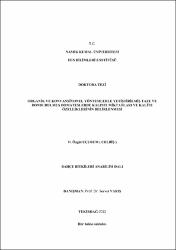| dc.contributor.author | Uçurum, H.Özgül | |
| dc.date.accessioned | 2017-04-21T07:12:00Z | |
| dc.date.available | 2017-04-21T07:12:00Z | |
| dc.date.issued | 2012 | |
| dc.identifier.uri | https://hdl.handle.net/20.500.11776/297 | |
| dc.description.abstract | Bu çalışmada; organik ve konvansiyonel yöntem uygulanarak yetiştirilen Rio Grande çeşidi domateslerin taze ve dondurulmuş meyveleri araştırmanın materyalini oluşturmuştur. Numuneler hasat edildiği gün, fabrikada organik ve konvansiyonel domatesler kabukları ile birlikte küp şeklinde doğrandıktan sonra -33 °C kabin sıcaklığında dondurulmuş ve -18 °C’de 1 yıl boyunca depolanmıştır. Taze domateslerde ve elde edilen dondurulmuş domateslerde 3., 6., 9. ve 12. aylarda fiziksel (duyusal, renk), kimyasal (SÇKM, pH , TEA, vitamin C, likopen, karoten, glikoz, fruktoz, ham protein, nitrit, nitrat) ve mineral madde (sodyum, potasyum, kalsiyum, magnezyum, fosfor, demir, bakır), ağır metal (kurşun, kadmiyum, arsenik, selenyum, civa) ve pestisit (300 etken madde) analizleri yapılmış, her iki yetiştirme tekniğinin taze domates ve donmuş ürünlerinin bazı kalite kriterlerine ve kimyasal kompozisyonuna etkileri belirlenmiştir. Taze domateslerin antioksidan (vitamin C, karoten ve likopen) içerikleri değerlendirildiğinde vitamin C (mg/100g) yönünden organik (21.69) ve konvansiyonel (22.09) taze domatesler arasında istatistiksel olarak önemli bir fark olmadığı depolamayla, vitamin C seviyelerinde sürekli büyük ölçüde düşüşler meydana geldiği görülmüştür. Karoten (ppm) ise, organik taze domateslerde (3.66), konvansiyonel taze domateslerden (3.36) daha yüksek olup, 12 ayda her iki yetiştirme yönteminde de en düşük seviyelere ulaşılmıştır. Likopen (ppm) ise karotenin zıttı olarak konvansiyonel taze domateslerde (99.97), organik taze domateslerden (81.52) istatistiksel olarak daha yüksek olup, zamanla vitamin C’deki gibi sürekli önemli düşüşler görülmüştür. Likopenin karoteneidler içinde en güçlü antioksidan olması nedeniyle konvansiyonel taze domateslerin antioksidan yönünden daha uygun olduğu söylenebilir. Besinsel paremetreler yönünden organik taze domateslerin daha yüksek protein (%1.92) içermesine karşın, konvansiyonel taze domateslerin daha yüksek glikoz (%1.33) ve fruktoz (%1.45) içerdiği, dondurulmuş domateslerde 12.ayın sonunda her iki yetiştirme yöntemi arasındaki seviyelerde önemli bir fark olmadığı tespit edilmiştir. Meyve kalite ölçütleri (SÇKM, TEA, pH ve Renk) açısından değerlendirme yapıldığında, konvansiyonel taze domateslerin SÇKM, TEA ve renk yönünden organik taze domateslerden daha üstün olduğu, pH yönünden önemli bir fark olmadığı görülmüştür. Konvansiyonel ürünlerde Na ve Mg, organik ürünlerde ise P, K, Ca ve Cu daha yüksek seviyededir. Organik meyvelerde pestisit bulunmamasına karşın, konvansiyonellerde taze ve üç ay depolanmış üründe pestisit tespit edilmemiştir. Ayrıca organik taze meyvedeki nitrat seviyesi de konvansiyoneldekinden daha düşüktür. Bu sonuçlarda, organik ürünlerin, sağlık açısından daha uygun olacağını gösterir. Yapılan duyusal değerlendirmeler sonucunda en fazla beğeniyi organik taze domatesler almıştır. | en_US |
| dc.description.abstract | Tomato cultivar Rio Grande were grown organically and conventionally and their harvested fruits were frozen and used as materials in this research. On the day of harvest the samples were separated as organic and conventional and their fruits were diced and frozen at (-33 °C) then kept for a year at (-18 °C). The physical (sensory analysis, colour), chemical (water soluble solids (brix), pH, total acids, vitamin C, lycopene, carotene, glucose, fructose, protein, nitrite, nitrate), minerals (sodium, potassium, calcium, magnesium, phosphorus, iron, copper), heavy metals (lead, cadmium, arsenic, selenium, mercury), pesticides (300 active ingredients) analiysis of the fresh fruits and frozen fruits were made in the 3rd, 6th, 9th and 12th months and the effect of growing techniques on the quality characteristics and composition of fresh and frozen products were determined. According to the antioxidant contents (vitamin C, carotene and lycopene), it was seen that there was no significant difference statistically between organic and conventional fresh tomatoes in vitamin C levels which were 21.69 mg/100g and 22.09 mg/100g respectively and vitamin C levels dropped steadily in significant amounts during storing. Carotene was higher in organic fresh tomatoes (3.66 ppm) than conventional ones (3.36 ppm) and both levels dropped to the lowest levels in 12 months. Opposite to carotene, lycopene level was higher statistically in conventional fresh tomatoes (99.97 ppm) than organic ones (81.52 ppm) and the levels dropped steadily as vitamin C levels dropped during storing. As Lycopene is the most effective antioxidant in carotenoids, it can be said that conventional tomatoes are more suitable for the antioxidant content. According to the nutrition facts (protein, glucose, fructose), it was found that organic fresh tomatoes had more protein (1.92 %) but conventionaly ones had more glucose (1.33%) and fructose (1.45%) and at the end of 12 month freezing period, both growing techniques had similar levels. If the fresh tomatoes were evaluated according to the quality parameters (water solube solids, total acidity, pH and colour), it was found that conventional ones were superior than organic ones in water soluble solids, total acidity and colour but there was no difference in pH levels. Na and Mg were more in conventional ones but P, K, Ca and Cu were higher in organic ones. Although there was no pesticide found in organic tomatoes, conventional fresh and 3 months stored tomatoes had pesticides, also nitrate levels were less in organic ones than conventional ones. These results show that organic products are more suitable healthwise. According to the sensory analysis, the most liked fruits were organic fresh tomatoes. | en_US |
| dc.language.iso | tur | en_US |
| dc.publisher | Namık Kemal Üniversitesi | en_US |
| dc.rights | info:eu-repo/semantics/openAccess | en_US |
| dc.subject | Taze organik domates | en_US |
| dc.subject | taze konvansiyonel domates | en_US |
| dc.subject | dondurulmuş organik domates | en_US |
| dc.subject | dondurulmuş konvansiyonel domates | en_US |
| dc.subject | Fresh organic tomato | en_US |
| dc.subject | fresh conventional tomato | en_US |
| dc.subject | frozen organic tomato | en_US |
| dc.subject | frozen conventional tomato | en_US |
| dc.title | Organik ve konvansiyonel yöntemlerle yetiştirilmiş taze ve dondurulmuş domateslerde kalıntı miktarları ve kalite özelliklerinin belirlenmesi | en_US |
| dc.title.alternative | The determination of residue amounts and quality characteristics of fresh and frozen tomatoes grown in organic and conventional ways | en_US |
| dc.type | doctoralThesis | en_US |
| dc.department | Enstitüler, Fen Bilimleri Enstitüsü, Bahçe Bitkileri Ana Bilim Dalı | en_US |
| dc.relation.publicationcategory | Tez | en_US |



















